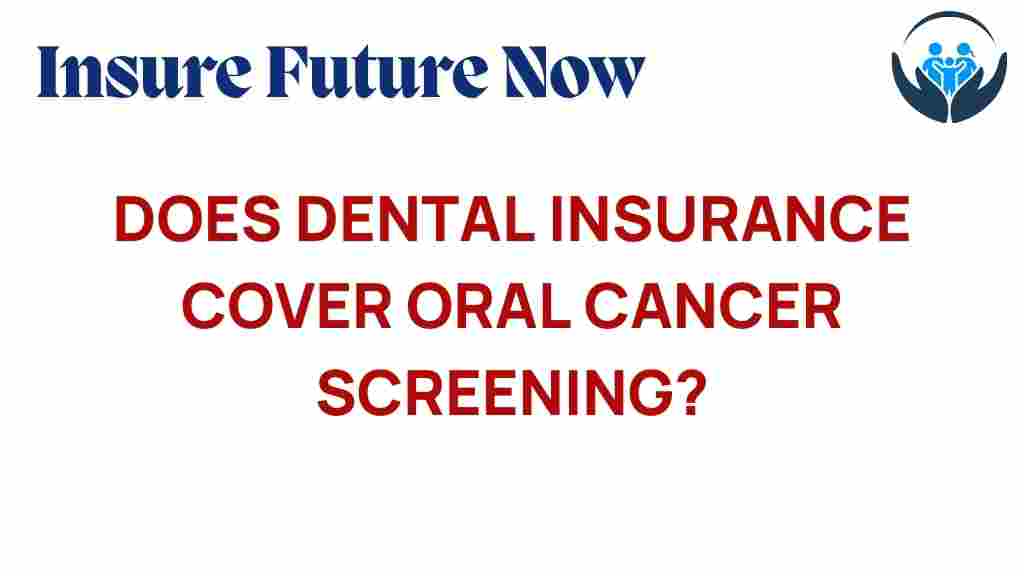Unraveling Dental Insurance: Does It Cover Oral Cancer Screening?
Understanding dental insurance can often feel like navigating a labyrinth, especially when it comes to specific procedures like oral cancer screening. This article aims to shed light on the coverage provided by dental insurance for oral cancer screening, emphasizing the importance of preventive care and the health benefits associated with early detection. We will explore how different insurance policies handle this critical aspect of dental health, patient rights in dealing with insurance, and the overall impact on healthcare costs.
What is Oral Cancer Screening?
Oral cancer screening is a preventive measure taken by dental professionals to detect signs of cancer in the mouth at an early stage. The screening typically involves:
- A thorough examination of the mouth, throat, and other areas for abnormalities.
- The use of specialized tools and techniques such as visual examinations and adjunctive diagnostic devices.
- Patient history evaluation to identify risk factors associated with oral cancer.
Early detection is crucial, as it significantly increases the chances of successful treatment and recovery. Given its importance, many patients wonder whether their dental insurance will cover the costs associated with oral cancer screening.
Understanding Dental Insurance Coverage
Dental insurance policies vary widely in terms of coverage, premiums, and the services they provide. Generally, dental insurance can be categorized into three main types:
- Preventive Care: This includes routine check-ups, cleanings, and screenings, often covered at 100%.
- Basic Care: This category might include fillings and extractions, typically covered at around 70-80%.
- Major Care: This covers more extensive procedures like crowns and bridges, often with lower coverage percentages.
Oral cancer screening often falls under preventive care, but coverage can vary. It’s essential to evaluate the specific terms of your dental insurance policy to determine if oral cancer screening is included.
Step-by-Step Process for Checking Coverage
To determine if your dental insurance covers oral cancer screening, follow these steps:
- Review Your Policy: Start by reading through your dental insurance policy documentation. Look for sections related to preventive care and screenings.
- Contact Your Insurance Provider: If the information isn’t clear, reach out to your insurance company directly. Ask specifically about coverage for oral cancer screening.
- Consult Your Dentist: Your dentist can provide insights into whether they accept your insurance and if they perform oral cancer screenings that would be covered.
- Check for Additional Benefits: Some insurance plans may offer additional benefits for preventive screenings, so inquire about any such options.
Patient Rights and Insurance Policies
As a patient, you have rights concerning your dental insurance and the services you receive. These rights include:
- Access to Information: You have the right to understand your policy’s coverage, including specific services like oral cancer screening.
- Transparency in Costs: Insurance providers must inform you of any out-of-pocket costs you may incur for screenings.
- Appealing Denied Claims: If your claim for oral cancer screening is denied, you have the right to appeal the decision.
Being aware of your rights can empower you to advocate for necessary health services and ensure you receive the benefits you deserve.
The Health Benefits of Oral Cancer Screening
Regular oral cancer screenings provide numerous health benefits, including:
- Early Detection: Identifying potential cancerous lesions early can lead to more effective treatment options.
- Informed Decisions: Awareness of potential risks allows patients and healthcare providers to make informed health decisions.
- Reduced Healthcare Costs: Early treatment can prevent the escalation of health issues, leading to lower overall healthcare costs.
These health benefits highlight the importance of understanding your dental insurance coverage and taking advantage of preventive care services like oral cancer screening.
Challenges and Troubleshooting Tips
Despite the clear benefits, many patients face challenges when trying to get their oral cancer screenings covered. Here are some common issues and troubleshooting tips:
- Issue: Denial of Coverage
Tip: Request a detailed explanation for the denial and ask if there are alternative codes or procedures that can be used for coverage. - Issue: Confusion about Policy Terms
Tip: Don’t hesitate to ask your insurance provider for clarification on any terms or conditions that are unclear. - Issue: High Out-of-Pocket Costs
Tip: Inquire about payment plans, financial assistance programs, or alternative providers that may offer lower costs for screenings.
The Future of Dental Insurance and Preventive Care
As healthcare continues to evolve, the focus on preventive care is becoming more pronounced. Dental insurance providers are beginning to recognize the long-term benefits of covering preventive screenings like oral cancer detection. This shift is likely to lead to:
- Increased Coverage: More insurance policies may start including comprehensive coverage for various types of screenings.
- Public Awareness Campaigns: There may be a rise in campaigns aimed at educating the public about the importance of oral cancer screenings.
- Policy Revisions: Insurance companies might revise their policies to better align with preventive care initiatives, ultimately benefiting patients.
Conclusion
Understanding the nuances of dental insurance and its coverage for oral cancer screening is essential for patients looking to prioritize their health. By knowing your rights, reviewing your policy, and advocating for necessary preventive care, you can navigate the complexities of insurance and ensure that you receive the health benefits you deserve.
As we move forward, it is crucial to keep the conversation about preventive care alive. Patients should feel empowered to seek out screenings and utilize their dental insurance benefits effectively. For more detailed information on dental insurance and preventive care, consider visiting resources like the American Dental Association or consult with your dental care provider.
By staying informed and proactive, you can ensure that your oral health is a top priority, ultimately leading to better health outcomes and lower healthcare costs in the long run.
This article is in the category Coverage and created by InsureFutureNow Team
